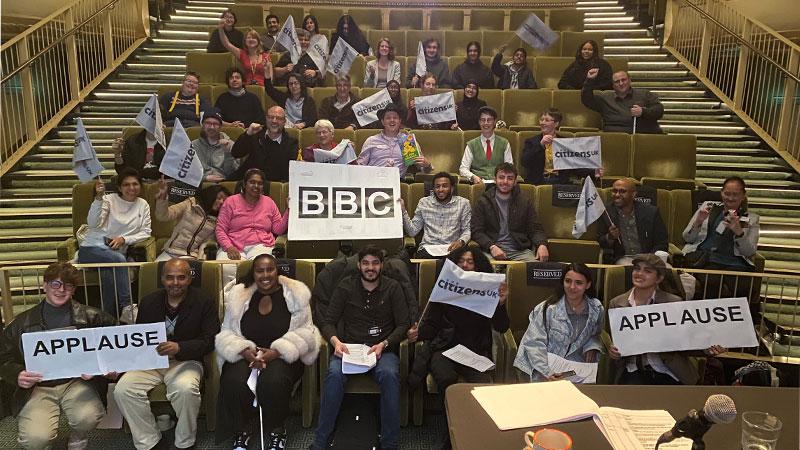Students and colleagues at the University of Westminster have joined forces with London Citizens and local campaigners for a powerful Living Wage Assembly to discuss how to push fair pay at the BBC and expand community action.

Held in the historic Regent Street Cinema, the assembly brought together students from multiple community organising university elective modules, colleagues and representatives from various civil society organisations under the London Citizens alliance. The event showcased the students' work on their campaign urging the BBC to become an accredited Living Wage employer, while also laying the groundwork for expanding the Westminster Living Wage campaign beyond the classroom.
The initiative is rooted in three university elective modules at the University of Westminster: Introduction to Community Organising, Community Organising and Collective Action, and Community Organising and Leadership. Each module is delivered in partnership with Citizens UK and immerses students in real-world social justice work, using Citizens UK’s five-step model: Organise, Listen, Plan, Act, Negotiate.
The assembly was hosted by Sociology BA Honours students Meriem Katlan and Matty Fergusen, who both have experience working with charities and unions to campaign against unfair pay. During the event attendees heard personal testimonies from students and workers who have experienced financial hardship and the injustices of low pay, particularly affecting migrant and ethnic minority communities.

From left to right: Meriem Katlan and Matty Fergusen
During the assembly students took it in turns to address the audience and highlight the actions they have taken, such as campaigning in the community and engaging directly with businesses around the University, including the Langham Hotel, Kingly Court and BBC Broadcasting House. These students included Intizar Jama, Preetham Devulapally and Maalik Omer.
There was also cause for celebration, as students highlighted successful campaigns that have led to real change, such as the NHS Trusts in North West London, becoming accredited as Living Wage employers thanks to efforts by Westminster Citizens. Meanwhile, the South London Living Wage team recently celebrated wins with the Globe Theatre, the National Theatre and the Tate, following creative protest actions including a play performed outside the theatre.
In the second half of the event, attendees discussed in pairs how best to influence the BBC. Proposed actions included organising a protest, writing an open letter to BBC employees, sharing real-life stories on social media and engaging unions.
Following on from the meeting, the group met outside BBC Broadcast House in Central London on 15 May for a protest to support their fight and keep urging the organisation to make a change.
Ahmed Saeed, Computer Science BSc Honours student, said: “Community organising, for me, was more than just a group project – it was a chance to engage in something real. I experienced personal growth by actually being involved, from the action planning to the negotiation phase. It challenged me to be confident, organised and to communicate with purpose.”
He added: “Campaigns succeed not just through passion but through structure, unity and shared purpose.”
Dr Hilde Stephansen, the academic lead for all the modules involved, said: "These modules are unique in that students don't just learn about social change at a theoretical level; they actually get to go out into the community and build their own campaigns, using the tools of community organising to create real social change."
Lucy Gardner, an Organiser from Citizen UK who has been working with the University to develop and deliver the community organising modules and support the University’s Community Organising Hub, a learning community of colleagues and students, added: “The University of Westminster is acting as a beacon of social justice in Westminster and across West London. It’s inspiring to see the students and colleagues at Westminster coming together to tackle injustices of low pay in the businesses surrounding the University in Westminster. Both the Community Organising module students and the Community Organising Hub, have been using the skills of community organising to take steps to creating change. Communities are strong when we come together!”
The student-led campaign directly contributes to the United Nations Sustainable Development Goals (SDG) 1: No Poverty, 10: Reduced Inequalities and 16: Peace, Justice and Strong Institutions. Since 2019, the University of Westminster has used the SDGs holistically to frame strategic decisions to help students and colleagues fulfil their potential and contribute to a more sustainable, equitable and healthier society.
Find out more about the College of Liberal Arts and Sciences at the University of Westminster.


